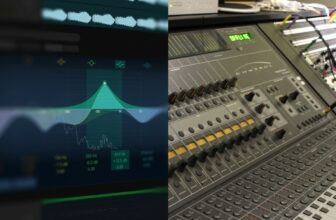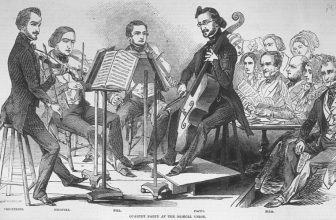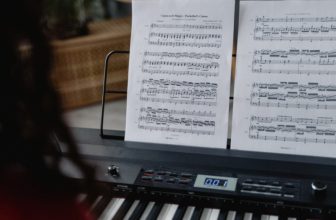100 Words to Describe Music

Music is so abstract that so many words are used to describe it. When describing music, we may reference its genre, its feeling, its emotional impact, the performance style, and its structure, while temperature words are often used as well.
Music has the ability to touch our emotions at a deep level, and it is something that we can all enjoy no matter what our taste in music may be.
Contents
Music Styles/Genres
Most people associate music with a particular genre. There are so many different types of music out there, each with its unique sound and style. Here are some popular examples with some words to describe them.
- Classical – soothing, relaxing, pretty
- Alternative – unique, cool, different
- Disco – fun, upbeat, happy
- Electronic – modern, danceable, intense
- Jazz – smooth, classy, sultry
- Metal – hard, heavy, aggressive
- Hip-Hop – cool, edgy, trendy
- Indie – artsy, different, melodic
- Rock – classic, timeless, iconic
- Reggae – chill, relaxed, easygoing
- Pop – catchy, fun, commercial
- Opera – powerful, emotive, classical
- Folk – down to earth, simple, rustic
- Instrumental – mellow, calming, pretty
- Soul – moving, meaningful, deep
- Blues – soulful, moody, expressive
- Country – heartfelt, twangy, storytelling
- Electro-Pop – catchy, synthetic, vibrant
- Gospel – uplifting, spiritual, powerful
- Punk – raw, rebellious, fast-paced
- R&B – smooth, rhythmic, sensual
- Ska – energetic, bouncy, brass-filled
- Techno – repetitive, futuristic, rhythmic
- Trance – hypnotic, electronic, euphoric
- World – diverse, traditional, exotic
Temperature
When it comes to describing music, temperature words are often used. This is because music can have a profound effect on our emotions, and can make us feel either warm or cold.
- Warm – comforting, cozy, inviting
- Cold – distant, foreboding, chilling
- Harsh – harsh, grating, abrasive
- Dark – sinister, mysterious, unsettling
- Loud – jarring, aggressive, overwhelming
- Low – mellow, relaxing, soothing
- Light – bright, cheerful, uplifting
- Fiery – intense, passionate, energetic
- Icy – crisp, clear, detached
- Steamy – sultry, hot, intense
- Breezy – light, airy, carefree
- Misty – vague, ethereal, soft
Feeling
When it comes to music, many different feelings can be associated with it. Some examples of ‘feeling’ words that can be used to describe music include: happy, sad, emotional, powerful, heartwarming, and depressing.
- Mellow – calming, relaxing, soothing
- Deep – meaningful, emotive, powerful
- Hypnotic – trance-like, mesmerizing, alluring
- Happy – cheerful, upbeat, positive
- Sad – melancholy, regretful, heartbreaking
- Heartfelt – emotional, moving, sincere
- Inspirational – uplifting, motivational, empowering
- Motivating – inspiring, ambitious, determined
- Uplifting – hope-filled, positive, optimistic
- Depressing – dark, sad, gloomy
- Powerful – moving, impactful, significant
- Euphoric – joyously unrestrained, exhilarating
- Nostalgic – sentimental, yearning, wistful
- Reflective – thoughtful, contemplative, introspective
- Soothing – gently calming, peaceful
- Turbulent – chaotic, disorderly, stormy
- Whimsical – fanciful, playful, quirky
Structure
The structure is another important element to consider when describing music. The structure of a piece of music can often be described as beautiful, clean, complex, dynamic, fresh, funky, or playful.
- Beautiful – pleasing to the ear, elegant, graceful
- Clean – well-organized, polished, neat
- Complex – intricate, involved, sophisticated
- Dynamic – exciting, energetic, lively
- Fresh – new, innovative, original
- Funky – groovy, hip, cool
- Playful – fun, whimsical, mischievous
- Layered – textured, complex, multifaceted
- Minimalistic – simple, sparse, unadorned
- Ornate – elaborately decorated, intricate
- Repetitive – looping, iterative, cyclical
- Symphonic – grand, expansive, orchestral
Musical Terms
There are a lot of musical terms that can be used to describe music. Some of these terms include beat, harmony, melody, tempo, rhythm, genre, crescendo, syncopation, texture, and tone.
- Beat – the steady pulse of the music
- Harmony – the combination of notes that create a pleasing sound
- Melody – a sequence of notes that create a tune
- Tempo – the speed of the music
- Rhythm – the pattern of the musical beats
- Genre – a category of music that shares a similar style
- Crescendo – a gradual increase in volume
- Syncopation – a rhythmic pattern that is offset from the main beat
- Texture – the overall sound of the music
- Tone – the quality of the musical sound
- Dissonance – a lack of harmony, tension, clash
- Dynamics – the volume variations within a piece
- Octave – the interval between one musical pitch and another with half or double its frequency
- Polyphony – multiple independent melody lines played simultaneously
- Timbre – the character or quality of a musical sound or voice as distinct from its pitch and intensity
Emotional Impact
Music has a profound ability to evoke specific emotional responses. The emotional impact of a piece can be defined by its ability to move the listener in a particular way, whether it’s bringing them to tears or filling them with exhilaration.
- Cathartic – emotionally purging, cleansing
- Haunting – lingering, unforgettable, eerie
- Invigorating – energizing, refreshing, stimulating
- Melancholic – deeply pensive, sad, gloomy
- Surreal – dreamlike, bizarre, fantastical
- Ethereal – otherworldly, airy, delicate
- Exhilarating – thrilling, electrifying, invigorating
- Nostalgic – wistful, reminiscent, evocative
- Majestic – grand, magnificent, stately
- Introspective – reflective, meditative, contemplative
- Resonant – echoing, reverberating, deep
- Lush – rich, opulent, luxuriant
Performance Style
The way music is performed can significantly influence its character and the listener’s experience. Performance style encompasses everything from the intimacy of a solo acoustic set to the grandeur of a full orchestral performance.
- Acoustic – natural, unamplified, pure
- Bombastic – grandiose, overpowering, theatrical
- Intimate – personal, close, detailed
- Raw – unfiltered, natural, unpolished
- Virtuosic – technically advanced, skillful, masterful
- Polished – refined, practiced, flawless in execution
- Theatrical – dramatic, staged with elements of theater
Conclusion
For those looking to expand their vocabulary to describe music, these 100 words should help you get started. With a variety of words to choose from, you can more accurately pinpoint the specific style or feeling that a piece of music evokes. Music is a complex and beautiful art form, and there are an endless number of ways to describe it.





